| Spotlight
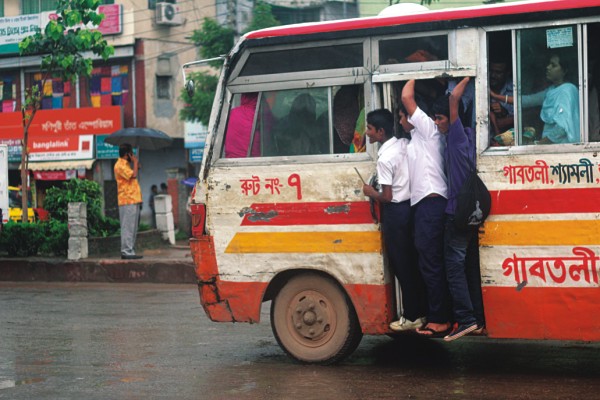
Battling it out!
Sumaiya Ahsan Bushra
Photos: Kazi Tahsin Agaz Apurbo
An anecdote:
Four o'clock strikes, cars are parked in a haphazard manner on the Mohakhali flyover. Crammed amongst people, a fourth year student Maliha Mazen Khan from BRAC sees the signal turning from red to green in an unending loop. Stuck in between small boxes, she waits an eternity. The clock strikes five, then six pm, but nothing seems to be moving. Her mind wanders off gazing at the signal. She falls asleep and then wakes up to the call of the Maghrib prayers. She has barely reached home and realises that she has missed three prayers and has a midterm the following day.
Given the condition of our traffic, getting anything done on time is a miracle. Considering majority of our population consists of the youth, it becomes extremely difficult for them to attend lectures, do assignments and then commute to and forth home. The main obstacles students face include getting to lectures or exams late. Precious time dedicated to education and other activities get delayed or completely deducted, and the cost of transportation reaches its peak particularly during the time of Ramadan.

Students queue up at bus stands to get home on time.
The government has taken initiatives by employing rules such as keeping the schools and colleges shut during Ramadan and by introducing new flyovers. Yet, that has not contributed wholly to the solution either. Fixing water lines in areas like Gulshan, Mirpur, Uttara, and Tejgaon, and construction of multiple flyovers at the same time has worsened the condition. This has decreased the width of the road since the remaining part of it is work under progress. Therefore, only a small number of cars can go through the narrow lanes and this contributes to traffic jams massively. These conditions only deteriorate during Ramadan, when everyone will be in a hurry to go home for iftaar.
| |
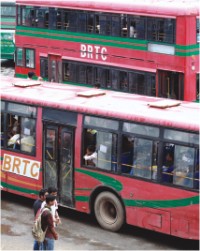 |
| |
The eternal wait never seems to be over. |
For all those students who travel either on buses, riders, challengers, cycle rickshaws or CNG run auto rickshaws, life is so much more difficult in Ramadan. Instead of getting several things done on a single day, they will only have a handful, productive hours to get their work done due to the traffic jam. As Sabbir Ahmed, a student of Department of Apparel Manufacturing Engineering at Bangladesh University of Textile, says, “Very little work gets done. I can never make it to a morning class due to the traffic situation in Ramadan. Things get worse when there is an exam and there is no way out for me. I barely get any time to study or do other recreational activities after getting home.”
In such situations, what possible alternatives could be sought? When one starts to contemplate the options they have, it becomes even more difficult, as there is no option but to deal with it. Important work needs to get done, particularly in a country like ours, capital flows based on time. Pre-planning must be done if last minute assignments pop-up. With a hopeless sigh, Ishita Sharmin Rayhan, a student of Media Studies and Journalism from University of Liberal Arts Bangladesh, explains her condition, “There really is no way out. If I could, I would stay home, but it is necessary to go out to attend lectures and sit for exams. When it comes to assignments and studying, the best way to do it for me is through social networking online. My friends and I communicate through facebook groups where we share our notes and study. Also, I plan ahead of time. Once I am done making a list, I get it done at one go.”

The traffic problem could be improved if more BRTC buses are introduced.
Another problem one comes face to face during Ramadan is the sky high transportation price. Firstly, it is quite difficult to find a rickshaw or a CNG run auto even a couple of hour before iftaar. Secondly, they are asked to pay a high price, literally. Rates increase by at least 25-50 percent.
| |
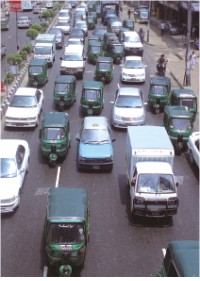 |
| |
Many CNGs are there yet difficult to find a good burgain. |
Mohammad Sarwar Zubair, a student of Nutrition and Food Science Department of Dhaka University, a rickshaw commuter, says, “I live in the university dorm. I often go out to give private tuitions and that becomes a major problem. If I take a bus, there is barely any space left to stand, let alone sit and if I take a rickshaw, the rickshaw puller asks me for more money. I can't afford to pay so much every day. This is a normal story in Ramadan, and every year, this month is becoming a difficult month to live in especially because of the lack of a proper infrastructure.”
Ishika Alim, a student of the Department of Architecture at BRAC University who travels by both bus and car shares a similar story. “I have to wait 1-2 hours in a queue to catch a bus. Once, I couldn't even have my iftaar due to this. The Uttara-Mohakhali bus route is the one I usually take and during Ramadan things become truly horrible. After a long day of classes, waiting for the transport to arrive seems surreal to me. I wonder if there really is justice out there. And when it comes to CNG run autos, things are no better. I am usually charged around 200 takas for a ride that is usually 100 takas. In Ramadan, travelling the shortest distance turns out to take the longest time.”
In addition, car parking in odd places create quite an inconvenience for people. Unlike on normal days, people tend to form a habit of parking their cars in random places for purposes like shopping or purchasing food for iftaar during Ramadan. There are no organised structures of traffic during Ramadan as the regular order of life comes to a change, due to shift in timings. When the clock strikes 4 pm, the office work comes to a halt and that's when there is a complete chaos and breakdown in the system.
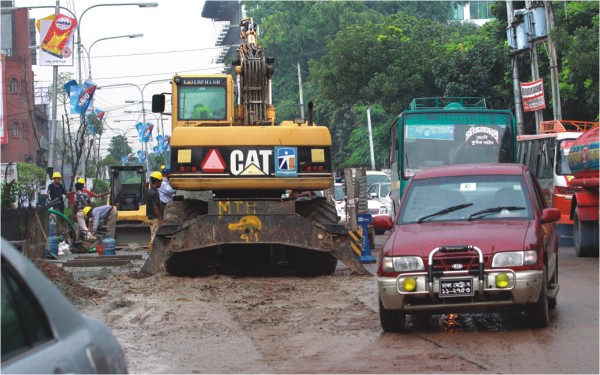
Poor infrastructure contributes to the existing condition of the traffic system.
As Tousif Farhad, a student of the Business Department at Independent University of Bangladesh, elaborates, “The bus drivers drive poorly and without any regard of the fact that there could be a fatal accident. Some buses have limited seats, yet they take passengers from different locations. Also, the rate for the fare varies all the time no matter what destination I travel to. In such a situation, for a student, things become difficult as we are not earning yet, we always have a money crunch. After a long Ramadan day in the scorching heat, it is a dreadful idea to stand and travel on a bus.” He adds, “This problem could be solved, if the number of buses like BRTC is increased. Since, these are buses with a good air conditioning and seating system, this will certainly help to some extent.”
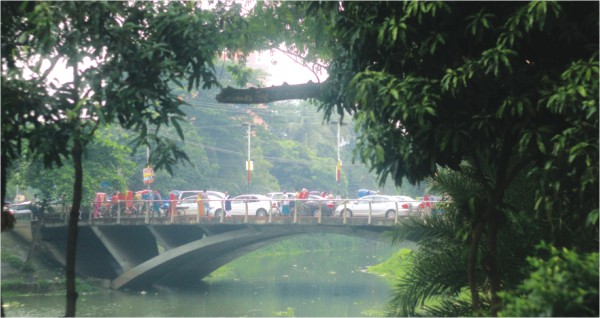
A common sight of traffic congestion even within residential areas during Ramadan.
Another student Udayan Ghosh, from the Department of Naval Architecture, Bangladesh University of Engineering and Technology who uses a bus to commute, says, “Even thinking about the huge jam is like a nightmare to me. Everyone is in a hurry to go home starting with the students, civilians, and people from other walks of life. I usually take the tero (13) number bus from Palashi to Gopibazar where I live. The buses are usually packed with people and during this time there is almost no space to even stand.”

Students face a dilemma when transportation cost rises.
Traffic situation during Ramadan in Bangladesh is truly a nightmare- whether we agree with it or want to overlook, it is a part of life and we as the citizens of the country must learn to battle it out. The drivers drive roughly, the roads are clogged, this time round, the rain will be pouring and in the midst of all that, lines of students are waiting, either inside their car or outside for the local bus or some means of transport to come and save them. And even when the signal goes from red to green it is only momentary till it changes back again and we are stuck in the same rut. With sixteen hours of fasting, lectures, examinations, projects, rocket high transportation price -- nothing will get better, unless, we take it on ourselves and look for a solution.
|
